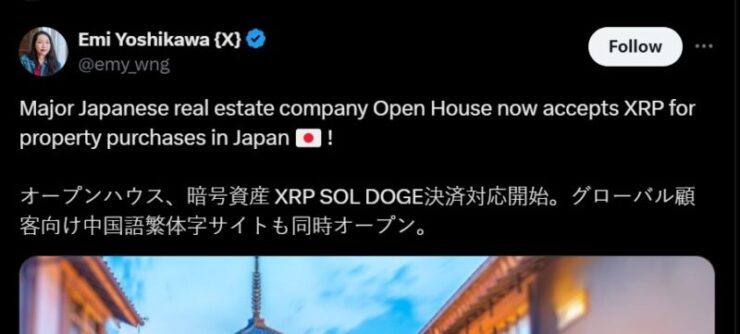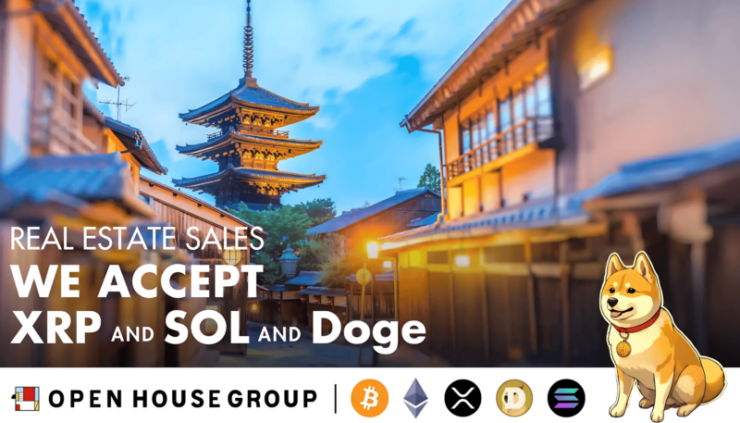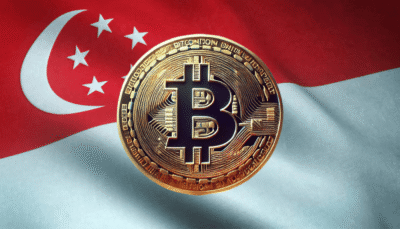Open House Group, one of Japan’s largest real estate companies, has broadened its cryptocurrency payment options to now include XRP, Solana (SOL), and Dogecoin (DOGE) for property purchases. The Tokyo Stock Exchange-listed firm announced the expansion in a press release, positioning itself at the forefront of crypto adoption within the real estate sector.
Previously, Open House had only supported Bitcoin and Ethereum for transactions. By extending acceptance to three additional popular cryptocurrencies, the company becomes one of the few major real estate firms worldwide, embracing a diverse range of digital assets for high-value purchases.
To ensure smooth and compliant crypto transactions, Open House has also opened a traditional Chinese site in addition to the English version. The new development allows buyers—both domestic and international—to seamlessly complete property deals using digital currencies, while also adhering to their country’s regulatory requirements.

According to the company, the decision is aimed at catering to a new generation of tech-savvy clients who are increasingly looking to diversify their crypto holdings through real estate investments. The company also highlighted its multilingual platform, Open House Global, which simplifies crypto payments for international customers.
“Rather than treating cryptocurrency price fluctuations as speculative, we aim to provide excellent financial services in the practical use of cryptocurrencies, particularly in the areas of cross-border payments and micropayments, in which cryptocurrencies excel,” the release stated.
Japan’s Growing Embrace of Cryptocurrencies
Open House Group stands among Japan’s top real estate firms, recording over ¥1 trillion (approximately $6.7 billion) in annual sales. Although the company only began accepting Bitcoin and Ethereum payments earlier this year, its engagement with the crypto sector stretches back several years.
The firm’s foray into blockchain technology began in 2022 when it launched research initiatives focused on integrating crypto solutions into traditional business models. Notably, Open House sponsored a study examining Bitcoin’s Lightning Network, reflecting its long-term interest in practical blockchain applications.
Leading these efforts is Yokiko Nishimura, head of Open House’s crypto division, who has played a key role in bridging digital asset solutions with local financial institutions and exchanges since 2015.
Open House’s expanded crypto payment offerings come at a time when Japan is solidifying its stance as a forward-thinking hub for digital assets. Earlier this year, Prime Minister Shigeru Ishiba underscored the importance of Web3 technologies and cryptocurrencies to Japan’s innovation agenda.
The country’s proactive approach has been further reinforced by the recent approval of the Payment Services Act, which lays down clear regulatory guidelines for stablecoins and crypto brokerages.
Global Trends in Crypto Adoption for RWA and Cross-Border Payments
The integration of cryptocurrency into real-world asset (RWA) tokenization and cross-border payment systems is gaining momentum globally, with several nations and organizations leading innovative initiatives.
The United Arab Emirates has been proactive in adopting blockchain technology for asset tokenization. In January 2025, Dubai-based developer DAMAC Group entered into a $1 billion partnership with blockchain platform MANTRA to tokenize real estate assets in the Middle East.
Abu Dhabi’s tech firm Realize also launched a tokenized U.S. Treasuries fund in October 2024. This fund converts traditional treasury investments into digital tokens on blockchain networks, offering investors a more streamlined and transparent investment vehicle.
Brazil is spearheading efforts within the BRICS economic bloc to implement a blockchain-based payment system aimed at reducing reliance on the U.S. dollar for cross-border transactions.
As of early 2025, Brazil has been developing a proposal for such a system, reflecting the bloc’s interest in leveraging blockchain technology to enhance financial autonomy and efficiency.
Beyond Japan, the UAE and Brazil, other regions are exploring similar innovations. For instance, the Redbelly Network, originating from research at the University of Sydney, offers a blockchain platform designed for compliant tokenization of various asset classes, including private equity and carbon credits.
This platform emphasizes regulatory compliance and high scalability, catering to both institutional and retail investors.
Quick Facts:
- Open House Group, Japan’s fifth-largest real estate company, now accepts XRP, Solana (SOL), and Dogecoin (DOGE) for property transactions.
- The company previously accepted Bitcoin and Ethereum, bringing the total number of supported cryptocurrencies to five.
- Open House opened an English and a Chinese channel to facilitate secure and regulated crypto payments.
- This move reflects growing institutional adoption of digital assets in the world, with countries like UAE,USA and Japan leading the charge.





